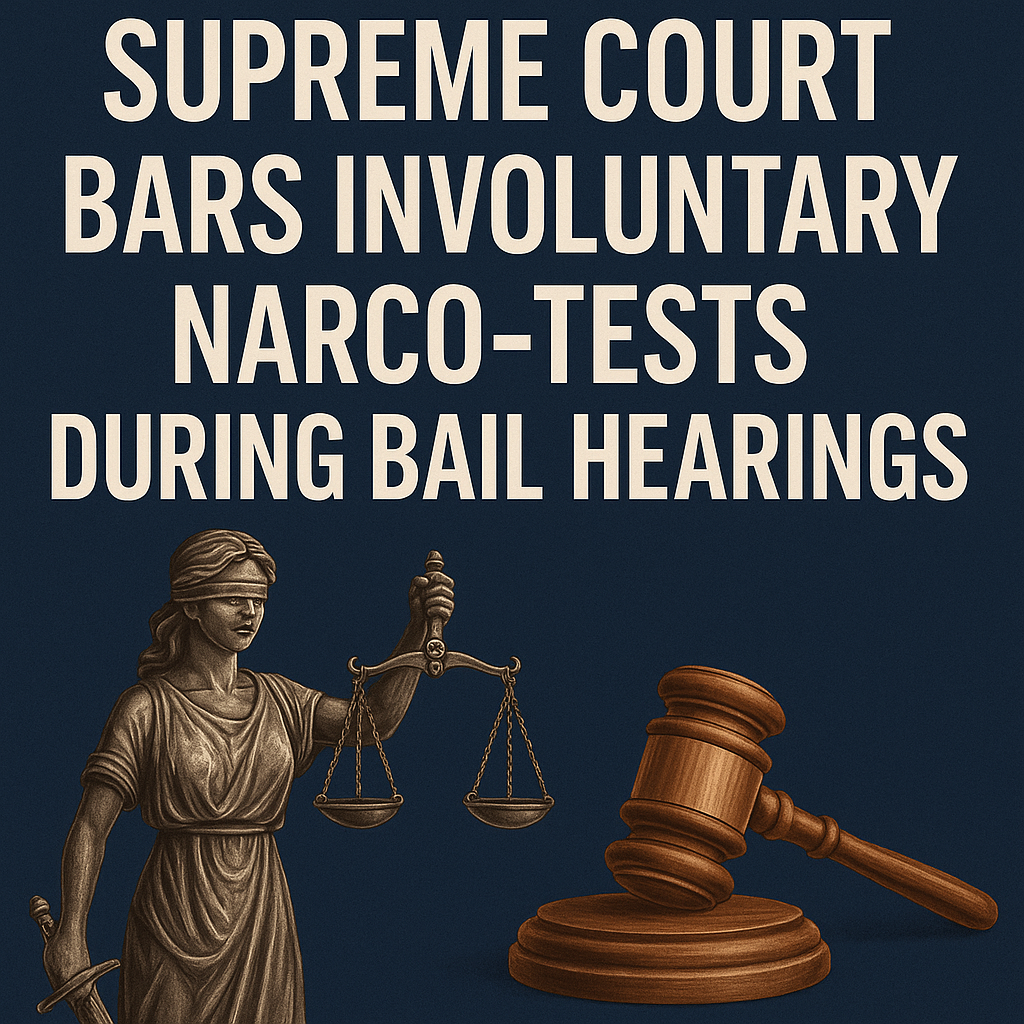By Vikas Rathi, Advocate, Partner, Lex Maven LLP
In a significant reaffirmation of fundamental rights, the Hon’ble Supreme Court of India, in Amlesh Kumar v. State of Bihar [Crl. A. @ SLP (Crl.) No. 5392/2024], has ruled against the conduct of narco-analysis tests without an individual’s voluntary consent, especially during the pendency of bail applications.
📌
Background of the Case
The case emerged from an FIR registered on 24 August 2022 under various sections of the Indian Penal Code, including Sections 498A, 364, and 506, alleging dowry harassment and disappearance of the appellant’s wife. The High Court of Patna, while hearing the appellant’s bail application, accepted a submission from the investigating officer that narco-analysis tests would be conducted on all accused persons.
Aggrieved by this, the appellant approached the Supreme Court challenging the High Court’s order as violative of constitutional protections.
⚖️
Issues Before the Supreme Court
The Supreme Court framed three pivotal questions:
- Whether the High Court could direct or accept a submission to conduct narco-analysis tests in the context of bail proceedings.
- Whether a voluntary narco-test report can serve as the sole basis for conviction.
- Whether an accused has an indefeasible right to undergo a narco-test as part of defence evidence.
🧠
What is a Narco-Analysis Test?
Narco-analysis is a technique wherein the subject is injected with psychoactive drugs (typically sodium pentothal) to reduce inhibition and facilitate the disclosure of information. However, the legality and ethics of this method have been hotly debated.
📜
The Supreme Court’s Ruling
In a detailed judgment authored by Hon’ble Justice Sanjay Karol, the Bench, also comprising Hon’ble Justice Prasanna B. Varale, held:
- Violation of Article 20(3) and Article 21: Involuntary administration of narco-tests violates the right against self-incrimination and personal liberty.
- Bail is Not a Trial: While considering bail under Section 439 CrPC, courts must not allow invasive investigative techniques or conduct a “mini trial.”
- Reliance on Selvi v. State of Karnataka (2010) 7 SCC 263: The Court reiterated that any forced scientific test like narco-analysis, polygraph, or brain mapping is unconstitutional unless consented to voluntarily and with judicial safeguards.
- Voluntary Tests and Section 27 Evidence: Even when conducted voluntarily, the results of a narco-test cannot be used as direct evidence. Only information subsequently discovered through such a test may be admissible under Section 27 of the Indian Evidence Act, 1872.
- No Indefeasible Right: An accused cannot demand a narco-test as an absolute right. Courts must evaluate the stage of trial, voluntariness, and adherence to NHRC guidelines before permitting such a test.
🧾
Guidelines Reiterated
The Court underscored compliance with NHRC guidelines for any voluntary narco-test, including:
- Consent recorded before a Judicial Magistrate.
- Access to legal counsel.
- Full explanation of implications and non-confessional nature of statements.
- Medical safeguards and independent administration.
🔍
Conclusion and Impact
The judgment is a timely reaffirmation of constitutional protections amid increasing demands for aggressive investigative techniques. It draws a clear line between investigation and trial, preserving the sanctity of bail jurisprudence. Most importantly, it reestablishes that individual liberty and dignity cannot be overridden by convenience in investigation.
This ruling sets a binding precedent ensuring that narco-analysis, whether voluntary or not, must always respect the legal and human rights of the accused.

